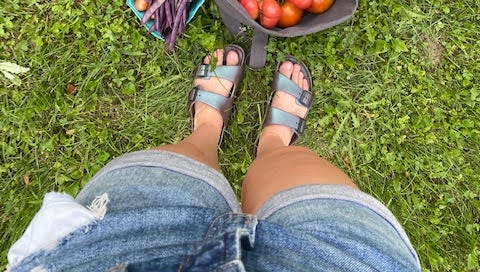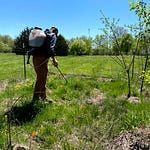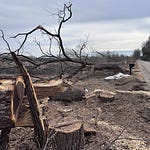This is the newsletter version of Sara by the Season, where I explore a little bit of everything that’s on my mind as I try to lean into nature’s wisdom and rhythms. You can listen to me read you the newsletter by hitting play above - or you can click the little link above and to the right to play in your favorite podcast player. If you know someone who would like this sort of thing, I’d be so grateful if you would share it!
I’ve been reading (well, listening) to Tyson Yunkaporta’s Sand Talk: How Indigenous Thinking Can Save the World, and I can’t stop talking about it (be glad you don’t live with me). One thing I’ve always had a curiosity about is the preconceived notions that we collectively assume are true, and Yunkaporta has me thinking about more of these than ever.
In one of my favorite chapters, “Romancing the Stone Age,” Yunkaporta says, “Most of us today are living in a state of compliance with imposed roles and tasks rather than a heightened state of engagement. We are slaves to a work ethic that is unnatural and unnecessary.” Even though I’ve done some noodling about the roots of the Protestant work ethic, I hadn’t considered that having a work ethic could be unnatural and unnecessary until I read Sand Talk1. I just assumed a work ethic = good. Laziness = bad.
But Yunkaporta got me thinking about my assumptions, so I did some googling. I came across this fascinating article by James Suzman, an anthropologist who has been studying the Ju/’hoansi people of southern Africa, one of the world’s oldest hunter-gatherer societies. According to Suzman’s research, “The Ju/'hoansi were revealed to be well fed, content, and longer-lived than people in many agricultural societies, and by rarely having to work more than 15 hours per week had plenty of time and energy to devote to leisure.” Marshall Sahlins, another anthropologist and author of Stone Age Economics, estimated that hunter-gatherers worked, on average, three to five hours per day (and contrary to our whitewashed, colonized ideas, were actually affluent by any standards).
We don’t even have to go all the way back to our prehistoric ancestors to see that our modern ideals around work are relatively new in the grand scheme of things. Author Juliet B. Schor reminds us:
One of capitalism's most durable myths is that it has reduced human toil. This myth is typically defended by a comparison of the modern forty-hour week with its seventy- or eighty-hour counterpart in the nineteenth century. The implicit -- but rarely articulated -- assumption is that the eighty-hour standard has prevailed for centuries…Before capitalism, most people did not work very long hours at all. The tempo of life was slow, even leisurely; the pace of work relaxed. Our ancestors may not have been rich, but they had an abundance of leisure. When capitalism raised their incomes, it also took away their time. Indeed, there is good reason to believe that working hours in the mid-nineteenth century constitute the most prodigious work effort in the entire history of humankind.
All of this looking back matters not because we can be absolutely sure of how our ancestors lived and worked, but because most of us Westerners are living with the assumption that I made above: that working hard has always been a good and necessary part of being a human. But for most of human history, not only was how we defined work and laziness different than how we do today, but humans had vastly different priorities if what we know of how they spent their time is true.
Because we’ve embraced this Western, capitalistic pedestalization (a word I made up to mean the noun form of “putting something on a pedastal”) of work, we structure so much of our lives around our careers. It’s the first question we ask when we meet someone, and for most of us, it is how we define meaning and purpose for ourselves. But for most of human history, we’ve defined meaning in vastly different - and often more sustainable, less personally, communally, and planetarily harmful - ways.
When the bosses complain about “quiet quitting,” (which is really just doing what your job description requires instead of going above and beyond what your employer has agreed to pay you to complete your work tasks), the powerful are selling us a premise about work that 1) isn’t even accurate and 2) we don’t have to buy into. By seeing our communal assumptions about the value of work as a fluid manifestation of cultural forces at work instead of black-and-white facts of “how it’s always been,” it helps empower us to determine what role we want work to play in our lives instead of just carte blanche taking the presuppositions that we’ve been handed.
Handing it off to Yunkaporta2 to finish off these Labor Day-induced thoughts on work’s role in our lives:
We still endure longer work hours than our roles require today, for reasons of social control rather than productivity. It’s difficult to find the mental space to question systems of power when we’re working eight hours, then trying to lift heavy weights that don’t need lifting or pedaling bikes that go nowhere for an hour so we don’t die of a heart attack from being stuck for a third of our lives in a physically restrictive workspace. We sleep for another third of our lives (although not if we have small children), then the rest is divided between life-maintenance tasks, commuting, and using the few remaining minutes to connect with loved ones, if we still have any. Somewhere in there we also need to find time to study and retrain, unless we want to finish up homeless when our industries inevitably collapse or change direction. The job is the unquestioned goal for all free citizens of the world—the ultimate public good. It is the clearly stated exit goal of all education and the only sanctioned reason for acquiring knowledge…
I am often told that I should be grateful for the progress that Western civilization has brought to these shores. I am not. This life of work-or-die is not an improvement on preinvasion living, which involved only a few hours of work a day for shelter and sustenance, performing tasks that people do now for leisure activities on their yearly vacations: fishing, collecting plants, hunting, camping, and so forth. The rest of the day was for fun, strengthening relationships, ritual and ceremony, cultural expression, intellectual pursuits, and the expert crafting of exceptional objects. I know this is true because I have lived like this, even in this era when the land is only a pale shadow of the abundance that once was. We have been lied to about the “harsh survival” lifestyles of the past. There was nothing harsh about it. If it was so harsh—such a brutish, menial struggle for existence—then we would not have evolved to become the delicate, intelligent creatures that we are.
If we haven’t always worked this hard or this long, that opens our imaginations to how differently we could choose to structure our lives. What other assumptions about “the way things have always been” are we making that keep us small, exhausted, and defeated?
Scattering Seeds
I’m always finding stuff that supports the thesis of the book I’m writing on the benefits of leaning into nature’s wisdom, so I thought I could start sharing those links and things here with all of you in hopes of some of the seeds I share germinating into something beautiful at your place.
Laura McKowen on what is enough, which is a question the natural world is far better at answering than we are.
I came across this quote from Wayne Muller on a podcast. It reminded me of my epic life theory and a reminder of how we can be most like the earth: “The word humility, like the human, comes from humus, or earth. We are most human when we do no great things. We are not so important; we are simple dust and spirit—at best, loving midwives, participants in a process much larger than we. If we are quiet and listen and feel how things move, perhaps we will be wise enough to put our hands on what waits to be born, and bless it with kindness and care.”
Some good questions to ask ourselves as we ground during this unsettled season before settling into the fall and winter ahead.
Here in Indiana, we can feel fall coming. I love anything that reminds me that death is an invitation, a doorway to transformation, especially as we prepare for the darker seasons ahead. In this lovely post, Ariella/beekeepinginskirts writes, “Death does not separate us. It is a door for evolving relationship.”
Cheers to rethinking some assumptions this week!
Sara
This is why reading from cultures outside your own, especially indigenous ones, is so important. It helps you to see that the ways you see the world aren’t the only ways to see the world. In other words, stop banning books for heaven’s sake.
Sorry it’s so long, but it’s all so good that I couldn’t bare to cut any of it. I read this bit to Grant who declared it the “paragraph of the year,” and I have to agree.















Share this post